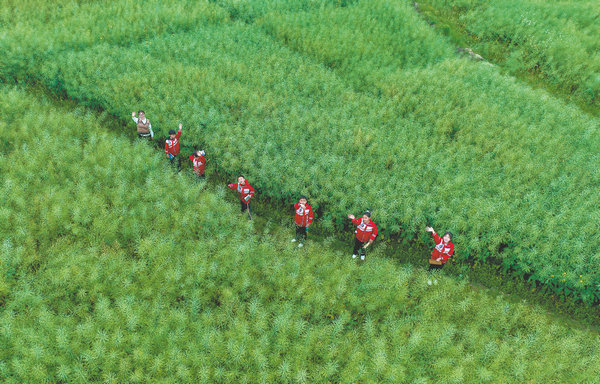

A rural teacher uses poetry as a prism to give children a fresh perspective on their lives
Surrounded by yellow rapeseed blooms, Li Bolin was flying kites with a group of her students. As the flowers swayed gently in the wind, kites carrying poems written by the children floated in the blue sky.
It was the first class of the spring semester, and Li, who teaches Chinese language in Suyu Hope Primary School in Pingcun town of Huitong county, central China's Hunan province, decided to go outdoors and encourage the students to write verses on the theme "dream".
One sixth-grader wrote: "Dreams are like little birds, able to fly to wherever their hearts go. My dream will also take to the air, flying up to the sky and clouds as well as the yellow stars. To visit the colorful kitten and one-eared fox, the cowardly tiger and ferocious rabbit. To see the dancing trees with leaves like rainbow mats."
"Their poems give me a feeling that they are talking," says Li.
She believes that each child has their own interests and passions and it is her calling to guide and encourage them to tap their potential to express these confidently.
"Poetry doesn't have to be complicated, I hope their writings flow naturally onto the page, rather than being some strictly crafted piece of work."
After graduating from Hunan First Normal University in 2017, the 27-year-old returned to her hometown and has been teaching in the remote rural school for six years. Studying part-time, she acquired a postgraduate degree from Hunan University of Science and Technology this year.
Located in the Wuling Mountains, nearly half of the school's students are children whose parents have migrated to cities for work.
At the beginning, like many other teachers, Li followed the conventional pedagogical method, teaching the children new words, rhetoric and patterns of writing, hoping that they would quickly improve their performance in tests.
At the end of the semester, however, Li found that her teaching method wasn't working as she hoped, the tests results were far from her expectation. "They showed little interest in class, and were easily distracted, which frustrated me."
It was when she read some letters she assigned as homework Li realized that the children have to endure the hardships of life in addition to their studies.
One of her students wrote: "Dad, please don't hit mom anymore. If you beat her again, I won't recognize you as my father."
And a letter from another child said: "A little tadpole is looking for its mother. It asked around and finally found its mom on a lotus leaf. I also want to find my mother, but no one can show me the way."
The bitterness expressed in these letters hit Li hard. Domestic violence, divorced parents, and many other miserable experiences cast shadows over the kids' childhood, but they carefully confined their inner thoughts and feelings to their letters.
"Rural children are often less confident than those who grow up in cities," Li says.